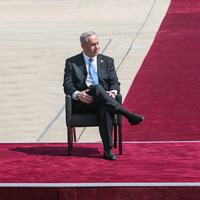Is Israel Alone?
The Past, Present, and Future of the U.S.-Israel Relationship
Applications are now closed.
Instructors: Michael Doran, Elliott Abrams, Charles Krauthammer, Joshua Muravchik, and Walter Russell Mead
Stipend: $1,000 (D.C. area residents); $2,000 (Domestic U.S. and Canada); $3,000 (International)

The last years have strained the relationship between the United States and the State of Israel. The two nations have serious policy disagreements and the nation’s leaders deeply distrust one another. Is this a true crisis? Is the America-Israel relationship fundamentally changing? Is Israel alone in an increasingly dangerous Middle East?
Israelis and American friends of Israel hope that ties of popular affinity, military cooperation, intelligence sharing, and strategic alliance against radical Islamism and terror bind the two states together. For the moment, both of America’s major political parties pledge to stand behind Israel at the United Nations and on the battlefield. Practically all Israelis across the political spectrum believe that strong ties with the United States are important to the survival of the Jewish State. Judging by these lights, at least, one might think that we are going through a bad patch—as Israel has with previous American administrations of both political parties.
But are circumstances changing in more fundamental and lasting ways? In the Middle East, the democratic optimism surrounding the Arab Spring has given way to bloody strife and civil war. Iran and the Islamic State, dueling empires of terror, expand through proxy and conquest, threaten America’s traditional allies, and hope to eliminate the Jewish State. America seems less willing to assume the responsibilities of ensuring stability in the world, and American withdrawal from the Middle East has coincided with and likely contributed to regional instability. Meanwhile, the global movement to delegitimize Israel has gathered steam and many judges of global opinion are convinced that Israel’s unwillingness to grant statehood to the Palestinians is the root cause of the area’s animosities and bloodshed.
Can the U.S.-Israel relationship be restored, so that it continues to serve the vital interests of both sovereign states? Do the sources of long-time friendship between these nations contain the seeds of its regrowth? Are Israeli interest and American interest truly aligned in the current age? What about the relationship must be rethought in light of new strategic challenges? Led by former National Security Council official and leading Middle East expert Michael Doran, this seminar will explore the past, present, and future of the America-Israel strategic relationship. Additional speakers will include former deputy national security advisor Elliott Abrams, columnist Charles Krauthammer, and foreign policy specialists Joshua Muravchik and Walter Russell Mead, as we explore the history, inner workings, and context of the U.S.-Israel relationship.
This institute is offered in conjunction with the Hertog Foundation: hertogfoundation.org.
Dr. Doran was in the Tikvah Center recently to discuss what the Iran nuclear deal means for the future of the Middle East. You can watch his analysis below:
